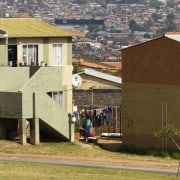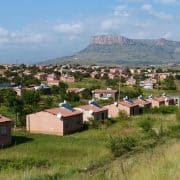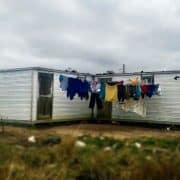|
Getting your Trinity Audio player ready...
|
When you live in a poor community – where most households survive below the bread line and thus rely heavily on assistance from government – there is bound to develop, over time, a culture of activism that seeks to hold said government accountable to its service delivery promises. For the community of Thembelihle, an informal settlement in the south of Johannesburg, Operation Khanyisa Movement (OKM) is one of the options available. The movement is led by Simphiwe Zwane, who is equal to the task.
Zwane was first introduced to Corruption Watch in 2013, a year after the movement had campaigned in the 2012 local government elections and at a time when OKM was a formidable cause in the fight for fair allocation of resources by the City of Johannesburg. Housing and electricity had been the two most urgent demands from Thembelihle in the run up to the polls, and Zwane, a mother of two, had been put forward by OKM supporters in her community as the favoured candidate for the position of ward councillor. An ANC candidate took the ward councillor position, while Zwane took the role of proportional representation (PR) councillor.
The proportional representation system allows parties that are relatively popular, but not strong enough to win ward seats, to take part in local government. This inclusive approach contributes to stability in communities, as all parties with a decent support base are drawn into running the local councils.
Unique to OKM’s manifesto had been a pledge designed by its members and endorsed by the community, which stipulated several obligations that Zwane owed to her community. One of these was to give a significant percentage of her salary to the movement to keep it sufficiently resourced.
Out of her income, Zwane would only keep enough to run her household and transport herself to Johannesburg council sittings, for instance. The rest, she told Corruption Watch at the time, would fund the day-to-day needs of OKM, such as transport for members to meetings, stationery and legal interventions where necessary.
“In terms of the pledge, after the City transfers my salary into my account,” Zwane said, “I transfer the whole amount to the trust account of OKM and only then do I get access to my living wage.” The wage was determined openly in a community meeting setting and was enough to support her household and cater for her council obligations as well.
Change is inevitable
The tide turned only recently for OKM in the recent local government elections on 3 August, when it lost its sole seat in the Johannesburg council. With the only link to a formal political structure of the city gone, OKM has had to reposition itself in the new political landscape. The change of political leadership within the metro accompanied this shift for OKM as well. With the help of a coalition with the Economic Freedom Fighters (EFF), the DA took power from the hands of the ANC, which had been running the city since the current democratic dispensation began.
What is the best thing that can come out of an independent councillor losing the only seat of her movement in an important metro such as Johannesburg?
Zwane says she is grateful for the lessons learnt from seeking accountability from within council, but losing the seat was not the worst thing that could have happened to OKM.
“Nothing has changed in terms of fighting for the community of Thembelihle and for its development,” she explained. “We are going to carry on with that, because we believe that powers are not within the City of Joburg, but with us as the community. We’ll keep on challenging them.”
She laments what she refers to as numbers politics trumping public interest within the Joburg council. “When tabling motions on issues that affect the poor directly, you would expect that members of the council who come from such backgrounds themselves would make an impact, for the good of those communities, but they vote along caucus lines.”
This way, it is the perspective of the party with the largest representation that prevails, regardless of how urgently an intervention is needed. “The mistake that councillors make is that they tread too far from people-orientated issues in support of their political parties’ interests. It’s a sad thing to watch.”
She readily concedes, however, that in her ward it was the EFF that gained ground on OKM’s territory and for that the party cannot be faulted. “I think the general atmosphere of the local government elections of this year, the environment within which we had to work, was not an easy one. We saw it coming in that it wouldn’t be an easy one because we had the EFF come in with a lot of support. I think that is what affected us, because in our community we had to share those votes with the EFF.”
OKM had hoped to win Ward 8, which is where Thembelihle is located, but this was not to be. The ward again went to the ANC.
The EFF’s presence in Parliament, said Zwane, in addition to their already-high profile, made the party attractive in her community, which has a high unemployment rate among young people. “They are in Parliament, we’re not in Parliament. The noise that they are making in Parliament – people are watching and everyone was interested in the EFF’s work in Parliament. They follow up on who they are, on Parliament, on what they are going to say.”
Winning back lost ground
Asked how OKM would regain the confidence among those members of the community who voted EFF, Zwane is adamant that the movement has well-built structures on which it can rely to maintain some degree of support. “We will go on – we continue to sit for our meetings; where there are challenges we try to address those challenges, if there is a need.”
“Even now, there are two letters that we must write to the new mayor as well as the MEC of housing. We wrote a letter to Mr [David] Makhura, the premier. We also held a meeting with him where we brought up a few challenges.”
The meeting with Makhura yielded some results and Zwane has confidence that his approach will differ from those of political heads in the past. “We had a meeting and they [the provincial leadership] responded. Normally we would sit in meetings with them only for them to say what they think we need to hear, but this was a successful meeting.”
One of the issues addressed was that of the relocation of a small community of settlers along the R53 road to Lenasia. “There are 14 families living there, and it’s an open area. They joined OKM, saying they are not safe and because they live in an open area, they deal with livestock remains that are dumped there illegally and these cause very bad odours and are a health hazard.
“They started to attend our meetings. We achieved victory in this meeting [with Makhura] because those families need to be relocated from that area to Thembelihle. It was agreed that stands would be sought for them and they would be moved to Thembelihle.”
Protesting towards recognition, accountability
Community protests are not uncommon in Thembelihle, and Zwane insists that with proper planning and careful implementation, they need not degenerate into violent riots. “The only weapon we have as communities is the fight we take to the streets, because not all efforts for negotiating around the table are recognised, and not all meetings are honoured. Unfortunately I have that experience of being stood up, despite the issues to be discussed being relevant and urgent.
“In my last address to the council, I expressed our gratitude as OKM for the electricity roll-out project currently underway in Thembelihle,” Zwane explained.
But, she added, it was important to keep in mind that the electrification of the settlement did not arrive on a silver platter. “We fought, some people were arrested, others injured. I was trying to drive the point home that communities should not have to resort to violence to get attention.”
Community protests by their very nature are not spur-of-the-moment incidents, argued Zwane. In a lot of instances they follow numerous subtle requests for attention made through official channels. “The community of Thembelihle last year resorted to blocking off the main road outside the settlement after numerous emails and calls were made to the Gauteng Human Settlements department in following up a memorandum of demands we had sent to then-MEC Jacob Mamabolo.”
“About 38 people were arrested in the five-day protest. We had to raise money for bail to get them out, and when we did we went back to the drawing board to figure out plan B.”
“While we were deliberating our next move, it was the department that sent us an email to say they want to have a meeting with us. Transport was arranged for us to get to the meeting venue, and once there we realised that Mamabolo had also called in other stakeholders, including the then MMC of housing [Dan Bovu].”
Mamabolo then showed the group plans for the registered housing project that will benefit residents of Thembelihle.
“This is why I say the only weapon we have as communities is protests. In reality, councillors do not have the powers to change people’s lives.”








